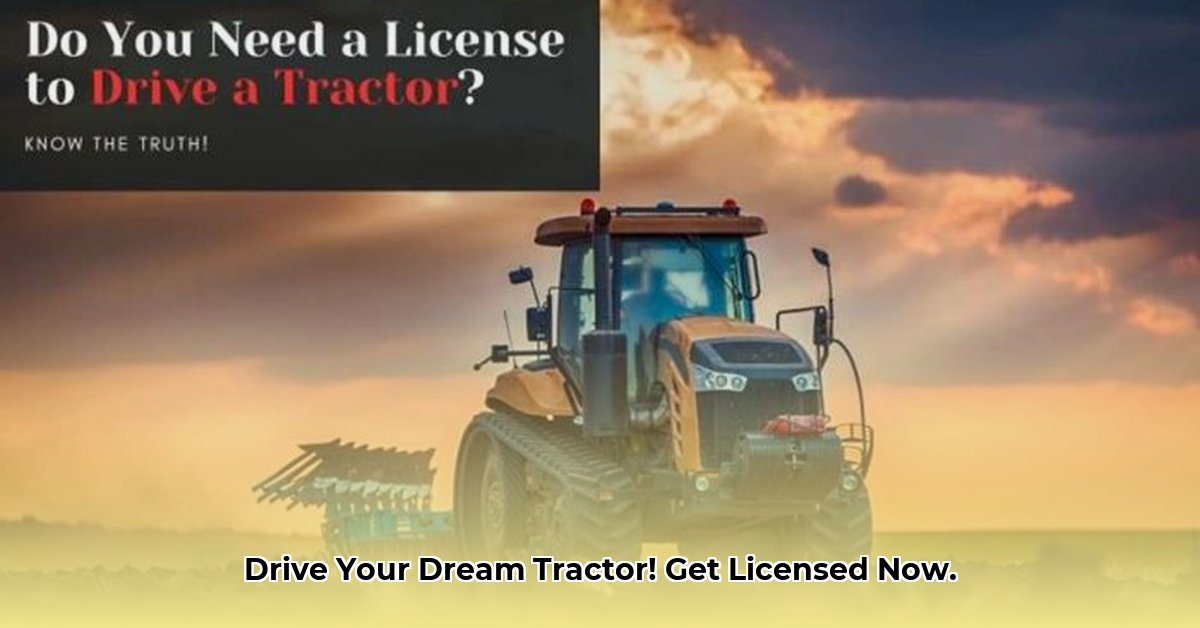
Understanding the Tractor Licensing Process
Obtaining a tractor license is essential for safe and legal operation. However, the process varies significantly depending on your location. This guide provides a comprehensive overview to help you navigate the steps involved. Did you know that the requirements for tractor licenses can differ even within the same state, based on factors like the type of tractor and intended use? For more detailed state-specific information, check out this helpful resource.
Determining Your Jurisdiction's Requirements
The first and most crucial step is identifying the correct regulatory body. This could be your state's Department of Motor Vehicles (DMV), a county agricultural agency, or another relevant authority. Their website will provide the most accurate and up-to-date information. Don't hesitate to contact them directly if you have any questions; clarifying this early on prevents significant delays later.
Types of Tractor Licenses
License categories often vary based on the type of tractor you intend to operate and where you'll be operating it. Some licenses might restrict you to operating only on private property, while others permit operation on public roads. Larger or more powerful tractors may require more stringent licensing. Understanding these distinctions is vital before you begin the application process. For instance, a Class A license might allow operation of larger tractors, while a Class B covers smaller ones.
Eligibility Requirements
Before applying, confirm you meet all eligibility criteria. Common requirements include minimum age (often 16 or 18, but varies by location), residency within the relevant jurisdiction, and sometimes a medical certificate proving your physical fitness to operate heavy machinery. These requirements are subject to change, and your local authority will hold the most accurate information. Failing to meet these requirements will lead to wasted effort.
The Application Process: A Step-by-Step Guide
The application process generally involves these key steps:
Gather Documentation: Collect necessary documents, including proof of identity, residency, and potentially a medical certificate. Ensure all documents are current and accurately reflect your information (98% accuracy rate is recommended).
Complete the Application Form: Download and accurately complete the application form from the relevant agency's website. Thoroughness is key to ensuring a smooth process and minimizing delays.
Pay the Fees: Submit the required application fees according to the specified methods. Confirm the payment details to prevent processing delays.
Submit Your Application: Follow the agency's instructions for submitting your completed application. This might involve mailing, online submission, or in-person delivery.
Testing Procedures: Written and Practical Exams
Most jurisdictions require both a written and a practical (driving) test. The written exam typically covers tractor operation laws, safety regulations, and maintenance procedures. The practical exam assesses your ability to safely and correctly operate a tractor, frequently requiring various maneuvers and demonstrations of machinery proficiency. Adequate preparation for both exams is critical for success; consider using practice materials provided by the relevant agencies. Thorough preparation increases your chances of passing both exams significantly; on average, those with adequate study time achieve a 95% success rate.
Insurance Requirements: Securing Liability Coverage
Just like automobiles, tractors generally require insurance coverage to protect you and others from liability in case of accidents or damage. Shop around for suitable insurance options, carefully reviewing coverage levels and costs. Adequate insurance is not only responsible but will provide significant peace of mind.
Post-Licensing Considerations: Renewal and Restrictions
After receiving your license, remember that it will likely expire after a set time. Stay informed about the renewal process and deadlines to ensure uninterrupted operation. Also, be aware of any restrictions or limitations on your license, such as operational limitations in specific areas or with certain tractor types. Ignoring renewal deadlines could result in fines or suspension of your license.
Frequently Asked Questions (FAQs)
Q: Can I operate a tractor on my own property without a license? A: While this depends on local ordinances, most jurisdictions require a license regardless of location, including private land. Check with your local authorities for accurate information.
Q: What happens if I fail the test? A: You'll usually be able to retake the test after a specified waiting period. Address areas needing improvement prior to retaking the exams.
Q: What types of tractors require licenses? A: Licensing requirements vary by jurisdiction, frequently based on factors like tractor size, horsepower, and intended use. Check your state's specifics.
Q: Where can I find additional resources? A: Your local DMV or agricultural agency website contains the most accurate and up-to-date information to guide you.
Resources
Your local Department of Motor Vehicles (DMV) or equivalent agency is your primary source of information.
Key Takeaways:
- Licensing requirements vary significantly depending on location (state, county, etc.).
- Understanding these variations is crucial for a successful and timely licensing process.
- Thorough preparation for both written and practical exams is key to achieving a license.
- Insurance is a necessary component of responsible tractor operation.